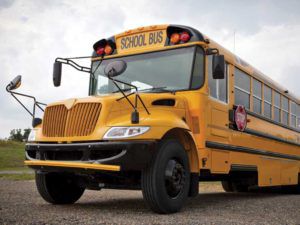By Huck Fairman
The New Jersey Sierra Club, including former New York City transportation
manager, Bill Baren, and local member, Kip Cherry, presented an informative talk on the benefits and challenges of replacing gas powered (or diesel) school buses with electric buses.
The benefits include the reduced emissions produced by electric buses.
In fact in New Jersey, transportation contributes as much as 45% of the
state’s greenhouse gas emissions. Reducing those emissions, specifically those from traditional school buses, will be healthier for students who ride or collect near them. The emissions and particulates produced by gas buses can cause or exacerbate asthma and other lung issues, as those emissions are ten times higher than automobile emissions and their black carbon is unhealthy to inhale.
Electric school buses also benefit the environment, and are quieter than the
current array of gas buses. At present, there are 16,000 school buses operating in the state, so the numbers and the environmental costs are significant.
As with electric cars, the maintenance costs are sharply less, with no oil changes and fewer parts to service.
However, as the cost of electric buses is greater ($250,000-$400,000 versus $150,000 per unit) various approaches have been and will need to be investigated. Leasing is certainly one. Federal and state financing assistance exists in other states and that should increase, as the health and environmental benefits argue on behalf of that assistance. Gov. Phil Murphy has pledged financing help to make the transition possible.
But as with all new technologies, electric buses come with challenges that need to be solved. Charging time and range will benefit from improvement, but those aspects will not be developed overnight. Both heat and air conditioning impact electric bus performance and must be dealt with. Regenerative braking, where brake usage increases battery power, could be part of a solution.
Part of the transition costs will include charging infrastructure and the training of drivers as well as ensuring that bus design takes into account bus routes and size. The role of utilities in producing the needed electric power will also have to be anticipated and altered. Utility power should be as clean as the buses it will service. New Jersey’s planned off-shore wind farms will ultimately play an important, and clean, role.
Finally, many of the students riding buses to school or school functions are keenly aware of the need to reduce emissions and make our environment healthier. It is for them ultimately, and the following generations, that the switch to electric buses, and to green power generally, is urgently needed.
The transition may take time and investment, but ultimately, it is essential.

